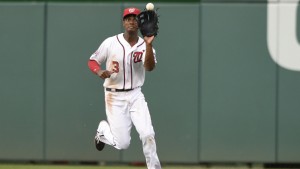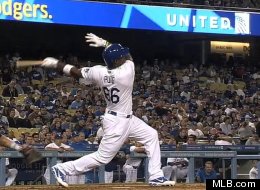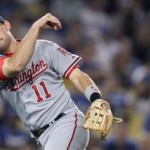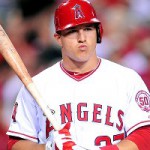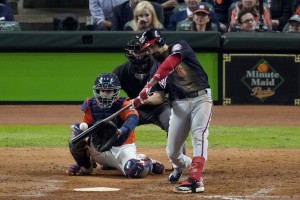
Rendon’s lasting legacy will be his amazing 2019 post season late inning performances. Photo via wtop.com
I’m not the only one writing about this particular question today, but its the biggest question the team has faced in a while.
Incumbent 3B Anthony Rendon, who before the season was thought in most circles to have no chance of matching Nolan Arenado‘s 8yr/$260M deal ($32.5M AAV), got a slightly shorter but higher AAV deal with zero deferred dollars by signing a 7yr/$245M ($35M AAV) deal with the Angels.
As we noted, Rendon made himself a whole lotta money in the post season. And he blows past the reported 7yr/$215M deal with significant deferred dollars (the Nat’s specialty) to stay here.
Nats ownership warned us they may not be able to retain both players, and now we know for sure. Despite tens of millions of dollars of expected new revenues flowing into the team, they still are beholden to the imaginary luxury tax line (thanks MLBPA!) and using it as a budget as opposed to a guideline for retaining home grown (but expensive) talent.
So now what?
Options seem to be:
- Play Howie Kendrick at 3B? He actually played nearly 100 innings at 3B this past season, didn’t make an error and had a decent UZR/150 and -2 DRS in a SSS sampling. I know he’s still athletic and in shape, but he’s a 2B/LF guy. He’s really not even tall enough to play 1B (he’s not even 6’0″). I think our defense takes a huge hit if he’s at third. BUT … it guarantees his bat in the lineup and allows the Nats to buy a big bopper 1B FA guy to hit in the middle of the order. Is it worth an experiment?
- Hand the keys to 3B for the next six years to Carter Kieboom? per Fangraphs, Kieboom played all of 10 games at third for AAA Fresno this year. He made four errors in those 10 games. Not quite as bad as his defensive show playing SS for the big club last April; 10 games, 4 fielding errors, -7 DRS (in other words, he basically cost the team two full wins by defensive runs cost). So, how is it possible he was THAT bad playing SS in the majors (where the fields are astronomically better than in the minors) and hasn’t been moved off the position yet to someplace like 2B or 3B where he can do less damage? Anyway; decision time has come. His hitting numbers in AAA were great: .303/.409/.493 and a 123 wRC+. that’s great; everyone’s hitting numbers are great in the PCL. What does that tell us? Can he start at 3B in the majors next year? Its a $25M question, because if he can’t, the next best alternative will be….
- Win the Josh Donaldson sweepstakes for the honor of paying him $25M/year (or more) as he rockets into his mid 30s. He just finished a show-me season in Atlanta in his age 33 season and thrived; now he’s looking for a 3-4 year deal at $25 per… is this what you want to commit to if you’re the Nats? We’re not the only team out there now desperate for a starting 3B. Philly, Atlanta, Texas, Los Angeles Dodgers, even the Mets all went into this season with a big checkbook looking to win Rendon (or at least a quality 3B). Now what? Do we pay the money for this guy? On the one hand, buying him weakens our biggest divisional rival (Atlanta) and blocks him from two other likely NL East rivals, both of whom might have interest. On the other hand, we buy Donaldson that’s a huge chunk of our remaining cap space (roughly $39m in my spreadsheet, probably slightly more once we figure out how MLB values Strasburg‘s contract on an AAV basis).
- Trade for Kris Bryant, the rumor of the week. He made $12.9M last year, probably jumps up to at least $16M in arbitration after another All Star season in 2019, and currently in the midst of a dispute over the most blatant service time manipulation case we’ve seen in the last decade. I’m guessing personally that he does NOT win the service time dispute and gains a 4th arb year, meaning that anyone trading for him gets two years of control. Now; do we want to empty what is left in our dwindling farm system for two years of Bryant? Lets be honest here; he’s a crummy defender whose defensive bWAR component cost him more than a win and who has negative advanced fielding metrics across the board. The Cubs had him in LF for more than 100 innings this year, and he was even worse out there. If you are willing to put up with a crummy defensive component at 3B to gain a big bat … isn’t that Kendrick for 1/3rd the cost? Or perhaps Kieboom for 1/25th of the cost? I’m not saying its apples for apples; after all Bryant was nearly a 5-win player by fWAR last year even with defensive issues. He’s a big middle of the order, former MVP, former 2nd overall pick. You’re going to pay for him. But at this point in the Nats lifecycle … with so little in the farm … do you want to blow it out for 2 years of a gun for hire with no ties to the city?
- Trade for some other 3B: who knows who else is out there for the having, or what they’d cost. Its impossible to speculate; lots of teams that I thougth were already tanking for 2020 are signing starters to 8 figure deals this offseason.
- Sign a lesser FA 3B: there’s two dozen FA 3B out there right now. Todd Frazier wasn’t bad last year. Starlin Castro can hit and could be a one year bridge to a prospect. Ben Zobrist may be old but he can still play 7 positions and may still produce. None of these guys would break the bank and could allow for the pursuit of a more expensive 1B option (which then allows you to put Kendrick at 2B, where he’s not great defensively but at least its what he knows).
What would I do?
I dunno. I like going with the prospect but Kieboom’s debut was not hope-inspiring. I like Kendrick at 3B to buy a 1B … but it has to be the right bat. I like keeping what prospect depth we have in lieu of trading for Bryant. I like the thought of a one year solution in a lesser 3B free agent, allowing Kendrick to 1B/2B and buying what we don’t have and enabling Kieboom to get more minors time.
Lots of options here.
